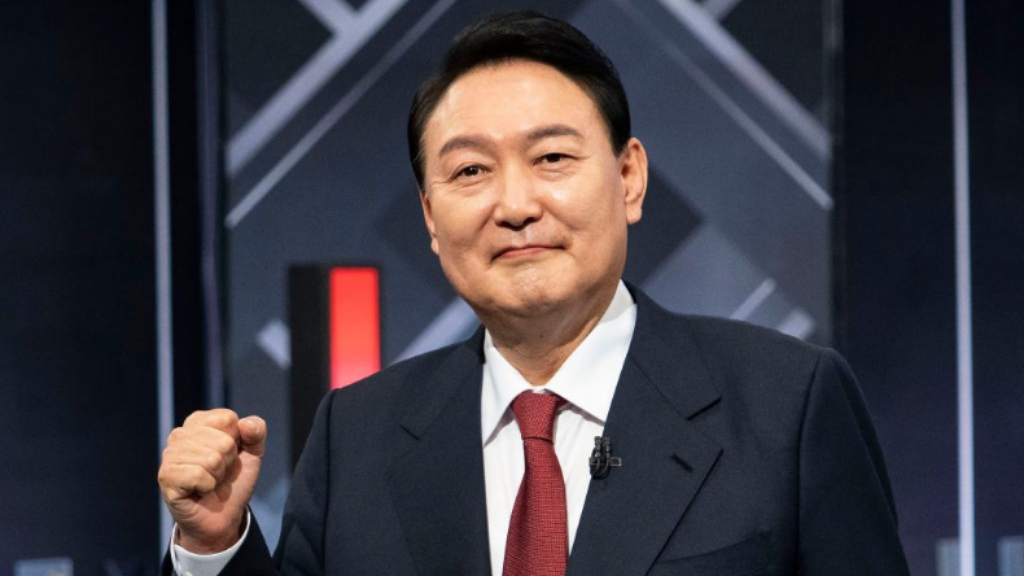
Taipei 101 skyscraper, a landmark in Taipei, southeast China's Taiwan. [Photo/Xinhua]
Editor's note: CGTN's First Voice provides instant commentary on breaking stories. The column clarifies emerging issues and better defines the news agenda, offering a Chinese perspective on the latest global events.
At the instigation of the United States, some American allies are becoming increasingly provocative on the Taiwan question, attempting to frame China's internal affair into a global "crisis" that is in "everybody's interests."
In an interview with Reuters, South Korean President Yoon Suk-yeol drew an analogy between the Taiwan question and the Korean Peninsula issue, insisting the question is "a global issue that goes beyond the regional level." In the meantime, British Foreign Secretary James Cleverly said in a recent interview with The Guardian that he "fundamentally disagreed" that the Taiwan Straits was a domestic matter for China.
These high-level politicians should at least learn a history lesson and some politics before hyping up the Taiwan question. Provoking China over the Taiwan question is playing with fire, and dancing to the U.S. tune will only end up sacrificing their countries' interests for the United States' desire to perpetuate its hegemony.
Taiwan's return to China is a component of the post-World War II international order – this is inked in the Cairo Declaration and the Potsdam Proclamation. The one-China principle – there's only one China in the world and Taiwan is an inalienable part of China – is a basic norm in international relations. Under this principle, the UN General Assembly adopted Resolution 2758 in 1971, expelling the representatives of the Taiwan authorities and restoring the seat and all lawful rights of the PRC government in the UN.
Denying the Taiwan question as China's domestic matter, Yoon-like politicians are not just acting ignorant in history, but also immature in politics. Being a pawn of the United States to play against China is short-sighted.
The White House has long regarded Taiwan as a handy "card" to play in its rivalry with China, and thus been applying salami-slicing tactics in its provocations on the Taiwan question. Escalating hypes about a military scenario in the Taiwan Straits, increasing military presence in the region, and sending high-level officials to the island, the U.S. has multiple plans for the unfolding of the cross-Straits situation.
Now, the U.S. government, with its hands cuffed in conflicts elsewhere in the world, is trying to turn the Taiwan question into a global "crisis." After all, wooing allies into this "crisis" will be much more cost-efficient than acting as a pioneer itself for the White House. In this context, China's domestic matter has to be framed as a "global issue" so as to fool allies including the UK and South Korea into becoming willing pawns.

South Korean President Yoon Suk-yeol. [Photo/Xinhua]
Washington has its dirty calculations. But do allies share any single slice of profit?
For Washington, "ally" is the synonym of "tool" that can be willfully manipulated to serve U.S. interests. As Yoon prepares for his summit with his U.S. counterpart Joe Biden, Washington has asked Seoul "not to fill any market gap in China" if chipmaker Micron Technology is banned from selling chips in the Chinese market, according to the Financial Times. While Yoon is desperately courting the U.S. in the hope to trade Washington's "protection" – at the cost of hurting ties with China, the U.S. government is ironically crippling South Korea's economic autonomy and asking this loyal follower to sacrifice its own interests for Washington's.
Reaping no profits from following the U.S., neither South Korea nor the UK can afford to ruin ties with China. While Washington has been fueling tensions on the Korean Peninsula by trading hostile words with Pyongyang, Beijing, as a cornerstone of stability in the region, has been playing a moderating role among concerned parties. Seoul has to rely on the Chinese government if it wants a peaceful settlement of the Korean Peninsula issue. Intensified defense cooperation with the U.S. government will only raise the anxiety levels of Pyongyang and turn the situation into a downward spiral instead.
In the era of global integration, American allies need to maintain sound economic ties with China. Cleverly-like politicians are naïve to provoke China on the Taiwan question – in an attempt to court the U.S. – on the one hand, and try to profit from the Chinese market on the other. Cleverly warned on Tuesday that a Cold War with Beijing would be "a betrayal of national interest" and thus the UK must engage with China. The British Foreign Secretary has failed to understand that respecting China's core interests is a prerequisite to sound economic exchanges between the two countries.
The Taiwan question is China's domestic matter. Framing the question into a global "crisis" is a U.S. trap to fool allies into its chariot. Before hyping up the Taiwan question, Yoon-like politicians should at least learn some politics so as to avoid becoming cannon fodder of the U.S.'s anti-China game.

 中文
中文



